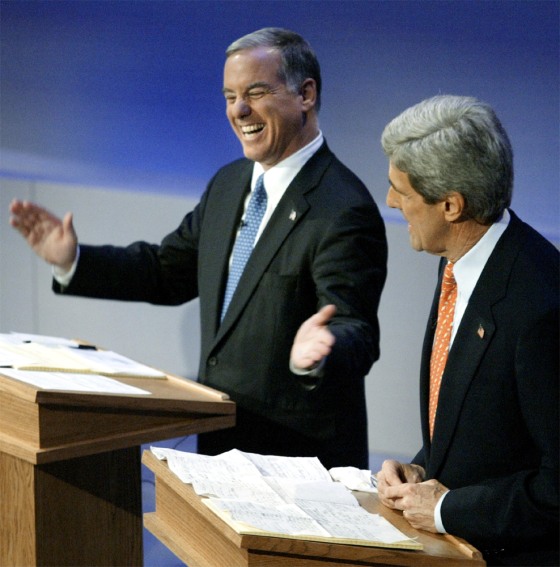In his campaign commercials, John Kerry is tagged as the Democratic candidate with “the courage to do what’s right.”
Perhaps someone should have told that to rival Wesley Clark. The retired Army general’s ads portray him as someone with “a quiet, real American courage” who “stood up for what he believed was right.”
Candidates Joe Lieberman and Dick Gephardt probably should have taken note, too. Their ads also talk of them doing “what’s right.”
A rip-off? A coincidence? Or is it simply the business of image-making?
Same constituency in primary season
Media consultants working for the presidential candidates strive to create television ads that will stand out as campaign commercials clutter the TV airwaves. But being different is difficult in this primary season because the Democratic candidates are appealing to the same constituency, talking about the same issues and, in some cases, highlighting the same traits in themselves.
“They’re going to sound alike in some ways, but they can’t be complete copycats or the voters won’t have any reason to pick one over the other,” said William Benoit, a communications professor at the University of Missouri-Columbia who studies political ads. “There’s also another danger — people will tune out.”
Six of the nine candidates vying for the Democratic nomination have used campaign commercials to emphasize values, oppose President Bush’s policies in Iraq in some form, advocate rolling back some or all of Bush’s tax cuts, and push for health care policies that would ensure more people have medical benefits.
It’s possible that media consultants are stealing ideas from each other.
But it’s more likely that polling done by each of the campaigns indicates that these are the issues most important to Democratic voters and, therefore, the themes that may resonate best when discussed in commercials.
Standing out
As a result, media advisers must work to make their candidates stand out in the field.
“Campaigns are about differences. In a crowded race you have to figure out a way to distinguish one candidate from the others,” said David Eichenbaum, a media adviser for former presidential candidate Bob Graham.
Typically, that means keying in on the message the candidate is sending overall to ensure it is woven throughout most of the ads a campaign will produce in an election year — and making sure that message is different from those of the candidate’s competitors.
For example, in their ads, former Vermont Gov. Howard Dean always emphasizes that he never has served in Washington; Gephardt, a congressman from Missouri, usually features his long history supporting labor groups; Sen. John Edwards of North Carolina often talks about making the country stronger through his comprehensive plan called Real Solutions for America; and Lieberman, a Connecticut senator, claims he is the candidate with integrity.
Still, candidates’ ads often sound or look alike if they have the same messages as their rivals.
In some commercials, Kerry, a decorated Vietnam veteran and a senator from Massachusetts, and Clark, NATO’s former supreme allied commander, have used their military backgrounds to try to set themselves apart as candidates who have the best foreign policy experience. They not only use similar language, such as the word “courage,” but also combat photographs.
Roots
Hoping to appeal to working-class voters, Gephardt and Edwards recall their roots in some of their ads. “My mother was a secretary, and my dad delivered milk door to door. They struggled so I could go to college,” says Gephardt. Edwards says: “My grandmother came from a family of sharecroppers. My father worked in a cotton mill all his life.”
And, to get voters to pay attention to ads about their health care plans, Gephardt and Kerry used the same tactic — they personalized the issue. Kerry talked candidly about being diagnosed with prostate cancer earlier this year, and Gephardt told the story of his son Matt, who overcame cancer as a toddler.
Media consultants say such overlap is part of the business.
“It’s advertising,” said Bill Carrick, Gephardt’s media adviser. “Doing an autopsy on every ad is not going to get you very far. Hopefully, voters view the candidates in greater depth than what we can do in a 30-second ad.”
